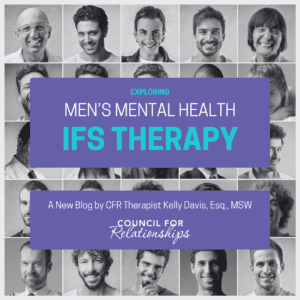Exploring Men’s Mental Health Through IFS Therapy
Many men feel pressure to be providers, leaders, and stoic figures of strength. In her latest blog, CFR Staff Therapist Kelly Davis shares how Internal Family Systems therapy (IFS therapy) offers powerful tools to support men’s mental health. Through the story of a fictional client, Kelly reveals how therapy can help men untangle complex emotions and find deeper connection with themselves and others.

Get matched with one of CFR’s 60+ therapists & psychiatrists.
Why Men’s Mental Health Is in Crisis
Timothy Ratliff, a successful executive and father of three, first came to therapy feeling overwhelmed and alone. His relationships felt distant, his work chaotic, and his sense of purpose unclear. Like many men, Timothy struggled but didn’t know how or where to start. For many, mental health issues go unrecognized or unspoken until they reach a crisis point.
Richard Reeves from the Brookings Institution explains that men today suffer in profound ways—socially, economically, and emotionally. Rates of depression, substance use, and suicide remain high, especially for working-class and marginalized men. The crisis in men’s mental health is real. While mental health challenges affect both men and women, men often face unique barriers to expressing vulnerability and seeking support. These challenges stem from traditional gender role expectations, which limit how men express vulnerability, seek support, or experience connection.
Barriers to Care for Men’s Mental Health
Why do so many men suffer in silence? Three main factors contribute:
Social isolation
Traditional male stereotypes discourage vulnerability. Without close emotional connections, many men feel isolated in their struggles.
Mental health stigma
Many men equate strength with silence. Asking for help feels like weakness. As a result, many delay or avoid treatment for mental health problems that could be addressed with the right support.
Suicide risk
Men account for nearly 80% of all suicides in the U.S. Middle-aged men remain especially vulnerable. According to the National Institute of Mental Health, suicide was the second leading cause of death for men ages 25–34 in recent years. In fact, studies show that men are over three times more likely than women to die by suicide in the U.S.
Timothy shared that he often self-medicated with alcohol and borrowed his wife’s Lorazepam just to get through the day—patterns commonly associated with substance abuse when emotional pain is left untreated. Like many men, he didn’t grow up learning how to talk about his feelings—only that he had to push through them.
How IFS Therapy Supports Men’s Mental Health
Therapy offered Timothy the first space in which he felt safe enough to open up. I introduced him to IFS therapy, short for Internal Family Systems—a model that helped him name, explore, and understand his conflicting emotions.
IFS therapy views the mind as made up of different parts. Some parts may carry old pain or fear, while others may try to protect us. At the center lies your true self—a calm, compassionate core that can guide healing.
This approach is especially helpful for men’s mental health because it allows space for complexity. Many men, like Timothy, feel torn between competing roles: provider, father, partner, and person. IFS gives those parts a voice—without judgment.
What IFS Therapy Looks Like in Practice
In early sessions, I helped Timothy explore his past. How was he raised? What did his parents model about masculinity, love, or asking for help?
Then, we began to notice his emotional parts:
- A part that feared his wife would see him as a failure if she knew about his business problems.
- A part that felt angry she hadn’t noticed his growing distress.
- A part considering suicide to escape feelings of shame and failure.
IFS therapy helped Timothy understand that all of these parts were trying to protect him—even the most painful ones. None of his parts were bad; they simply needed to be heard and understood.
Building Emotional Awareness in Men’s Mental Health Treatment
Through our work together, Timothy began to slow down and connect with himself. In IFS therapy, we:
- Practiced grounding techniques – to soothe anxious thoughts and center the body.
- Noticed emotions and sensations – helping him locate where feelings lived in his body.
- Got curious about specific parts – asking what each part was trying to do for him, and where it originated.
Many men have never been asked these questions before. By slowing down, Timothy could finally name what he felt. He discovered that his shame came from childhood beliefs about being a “good man.”
How IFS Therapy Encourages Self-Compassion
One of the greatest strengths of IFS therapy is its compassion. Instead of trying to fix or silence parts of ourselves, we welcome them with understanding.
For Timothy, this meant learning that emotional overwhelm doesn’t mean he’s broken. It means he’s human. He no longer felt like he had to bottle everything up. He saw that he could be both strong and vulnerable.
He began to open up more to his wife, talk to his children, and ask for what he needed. He still had fears—but he also had new tools, and more self-trust.
Are You Ready to Explore Your Inner World?
IFS therapy can be a powerful approach to healing for men—and for anyone facing inner conflict or emotional struggle. If you feel torn between parts of yourself, unsure of how to begin, or simply overwhelmed, know that support is available.
Men’s mental health matters. Therapy and mental health services can help you explore what it means to be a man today—with empathy, curiosity, and connection.
Editor’s Note: The views expressed in this blog are those of the author and do not necessarily reflect the official policy or position of Council for Relationships.
Learn More and Connect with CFR
Council for Relationships offers therapy, education, and resources to help individuals and families heal and grow. If you’re ready to take the next step in your mental health journey, we’re here to support you.

Request a therapy appointment with Kelly Davis.
About the Author: Kelly Davis, Esq., LSW
Kelly Davis is a Staff Therapist at Council for Relationships. With a background in both law and clinical social work, Kelly brings deep compassion and practical insight to her work with individuals and couples. She is especially passionate about helping men navigate emotional overwhelm, life transitions, and relationship challenges.
Ready to begin your journey? Request an appointment with Kelly Davis.
More from Council for Relationships: IFS Therapy, Art Therapy, & Much More
Want more insights like this one? Check out the CFR blog for expert perspectives on mental health, relationships, and therapy
- Explore our blog archive.
- Sign up for our email newsletter for updates.
- Get matched with a CFR therapist—we have over 60 therapists and psychiatrists ready to support you.
Meet Kelly Davis, Esq., LSW: Bridging Law, Advocacy, and Therapy
Emily Mudd: Celebrating the Founder of Council for Relationships | Part Two
